
(After some unforeseen delays on our part, today we are honored to bring you Comrade Aleks‘ in-depth interview with Greek metal writer and historian Aris Shock, focusing on his two landmark books about Hellenic black metal, and with hints about the third one to come.)
It’s an extremely rare case, but today we’ll speak not with a musician, but with a journalist. The paper books turn into artifacts, the runs drop low, and you won’t get rich writing about underground metal bands, I know. But some metalheads turn to keeping the old-school attitude, and that’s why we have a kind of small vinyl renaissance, reprinting some old fanzines, and so on.
Today we’ll speak with Aris Shock, who started to release a printed fanzine Shock! Aesthetics in 2001 covering extreme music and horror movies. His interest in both led him to the idea of focusing on covering and supporting the local underground scene. Thus, the Rites of the Abyss book was written. As Aris’ first book explored and revealed the history of such phenomena as Hellenic Black Metal, his second work was the natural continuation of the first one, as The Serpent & The Pentagram is the biography of Necromantia, one of three core representatives of the genre.
We did the interview with Necromantia‘s spiritual leader The Magus a few weeks before this one regarding his new album and this book [published here], so the interview with Aris is one more logical link in the chain of events related to the world of Hellenic Black Metal for me personally.
******
Hi Aris! How are you doing? What’s the last Hellenic black metal band you listened to?
Greetings, brother! All good here in the Shock dungeon. The latest relevant album I listened to was Varathron’s The Crimson Temple and it blew me away. They went for the jugular with this one. In terms of music, aesthetic, live performances and everything, the band seems to be at the peak of their long presence in the scene.
Yes, yes, we did the interview with Haris here not so long ago, so our readers know a few things about The Crimson Temple. Such a coincidence! Well, how did you become involved in music journalism? What’s your background?
Actually, I didn’t study journalism and that isn’t my profession either. But I was interested in it as a fan. I started a horror/cult movie & extreme music fanzine written in Greek named Shock Aesthetics in 2001. With 61 issues so far, it’s still kicking but renamed Shock and made as an e-zine. Also I have a blog in English where I just upload most of the interviews. There was a large and very active fanzine network in Greece from the mid-’80s to early ’00s but almost all those zines are long gone now. And that’s a pity…

Your first book, Rites of The Abyss, was published three years ago. Despite being relatively popular, black metal remains a niche genre, so how long did you think before starting your work on the book?
The idea came from an interview I had with an old Greek black metal band in one of the issues of Shock. It was for a ‘‘satanic panic’’ special with satanic horror movies, books and music. I realized there were many interesting stories from the past to be shared and that’s why I was intrigued to start the book. And as a metal fan, I couldn’t resist.
Soon enough though I decided it shouldn’t be like an encyclopedia. It seemed more fitting to build it on stories from people in the scene. They are the protagonists, no doubt about it. I organized the chapters, questions and other material and kept my words more restrained. My questions to the people interviewed can be surmised, sure, but they are not presented. It flows more like a story in several acts, where I am the narrator.
How much time did it take to gather all the information you needed to complete it? And how much did the book overgrow the initial size you intended to get?
As you experienced it with your own books, it was a long and demanding process. It took more than two years to finish everything. A lot of the research and interviews were done during Covid lockdowns, so I had more free time. If not, it would have taken longer. Also, the band members, fanzine publishers, label owners, studio owners etc. would be harder to reach, because of touring, work and other obligations. During the lockdowns, all of them were easier to respond.
The book didn’t overgrow its initial size but slightly changed its content. The people I talked to gave me ideas to add more subjects or enrich them. They took the whole story in several interesting directions. And I loved that every time it happened.
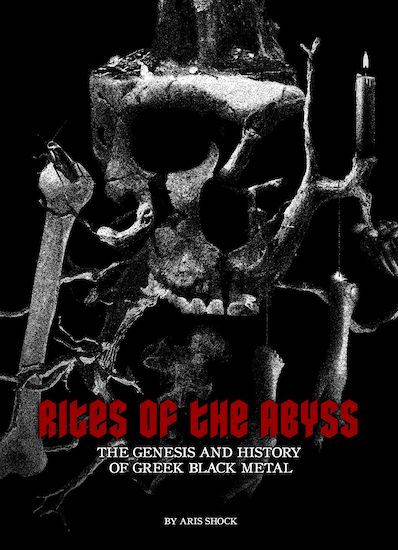
Which stages of the local scene’s development would you highlight? Was there a kind of turning point that determined them?
In my opinion, the key periods in the Greek black metal scene were two. The first one was 1989-1990. That’s when Varathron and Necromantia gave their first demos and when Rotting Christ turned to a slower and darker path with Satanas Tedeum and Passage To Arcturo. Members involved in these bands, as well as some other unsung heroes, actually laid the foundations for what was later called ‘‘Hellenic black metal’’.
The second key period was 1993-1994. The era of the legendary Molon Lave/Storm Studio and when the local scene got more international recognition. All three big bands signed to foreign labels then, which was a milestone event. I remember talking with fellow metalheads at school and us saying ‘‘Holy shit, Rotting Christ signed with Osmose!’’. Also, several other bands got in the spotlight and the scene grew stronger. But again, that was timed with the avalanche of the Norwegian scene and its worldwide influence. So, I dare say that from that point onwards, the Greek scene diversified a lot in terms of sound and aesthetic.
Just a month ago or so, I asked the same question to The Magus and then to Haris from Varathron. How do you see the features of the Hellenic black metal scene? Even its three core bands are so different, which always puzzled me. It’s like with the ‘UK Three’ in death-doom: they were always different, and yet they were parts of one phenomenon.
You are right. I think that the characteristics of the Hellenic black metal scene came from the people who founded the key bands. Also from their music interests, their ideas and of course their interaction.
I could say that the ‘‘Greek school of black metal’’ can be identified by certain elements: a more mid-tempo, melodic and atmospheric approach, more prominent bass, synth passages, what is called ‘‘Greek blast-beat drumming’’ and a slightly ‘‘Lovecraftian’’ occult approach. Of course, Rotting Christ, Varathron and Necromantia had their own sound and aesthetic but they complemented each other perfectly. We shouldn’t forget they often shared members and also helped each other with recordings, live shows, making flyers, T-shirts, fanzines together, etc. I think the friendship, interaction and mutual support of these titans of the Greek scene started the whole phenomenon.
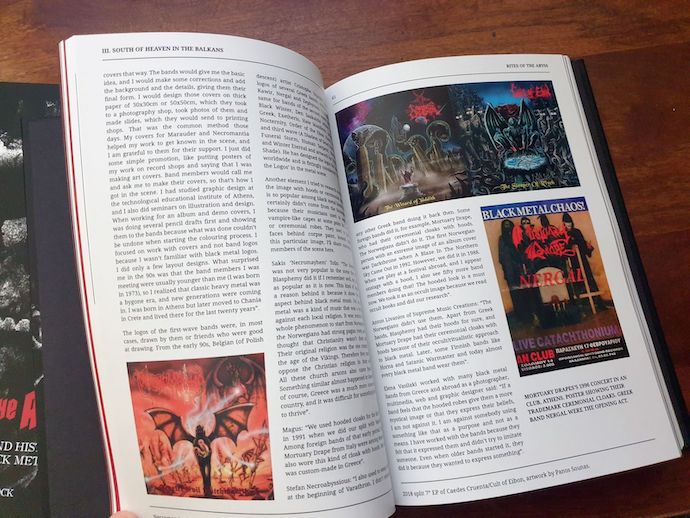
Why do you think the Greek scene stood aside from scandals like it happened in Norway? Were the ’90s relatively calm, or did some extreme acts happen in your area? Did you have your own “satanic panic”?
Of course, events like the ones in Norway couldn’t have happened in Greece, because it was a more conservative country. What we actually experienced was an era of ‘‘satanic panic’’ during 1992-1995. The funny thing is that members of Greek black metal bands didn’t commit any crimes. It all started from two murders committed by a gang of so-called satanists, who were not band members. Their interrogations, trial and final conviction came with an unprecedented hysteria against metal music from the local press and the orthodox church. That caused several kinds of problems to Greek band members, as well as metal fans.
I vividly remember those unpleasant years as a teenager. So, in the same period in which the fame of the Norwegian scene exploded worldwide through the crimes in their country, the Greek scene actually had to take a few steps back.
Is Greece now a more tolerant country than it was in the ’90s? And is it a good or bad thing regarding the black metal scene? There are a lot of examples about how modern tolerant policies take the most absurd forms you can ever imagine.
Well, sure things in the country are more tolerant than in the ’90s. Entering the European Union as a full member obviously helped a lot in that aspect. No more metal-hunting crusades from the orthodox church, at least! And that allows the local black metal scene to be active and expand.
On the other hand, there are new trends that pass as forward-thinking but at the same time are very restraining. These are confusing times indeed. And there’s still no funding or other help from the Greek state or any cultural institutions. The metal scene in general is left on its own.
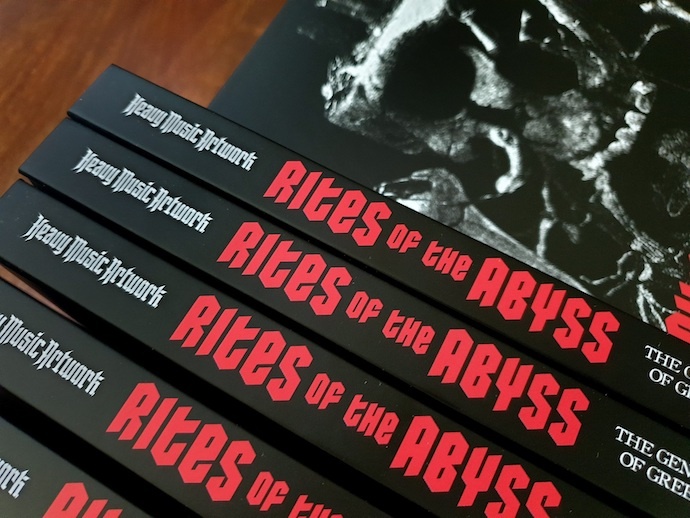
Can you tell if Hellenic bands have a tendency to one or another ideology?
Not really, the way I see it. Their diversity in terms of ideology seems as vast as the diversity in terms of music: they cover everything. Purely satanic, blasphemous, Lovecraftian, luciferian, draconian, totally nihilistic or misanthropic, esoteric, gnostic, and so on.
How much does a common cultural background influence the Hellenic metal scene? I mean bands like Kawir and – why not – Septicflesh.
I feel it does influence bands and not only the two you mention, which are good examples, nevertheless. But you can notice ideas from byzantine music, choral elements or traditional folk music in several other Greek bands, old and new. Add to that the theatrical element, which in our case derives from the ancient tragedies, so our cultural background shows its influence.
There’s the chapter ‘Brothers in Blood’ in the book, where you describe the Cyprian scene, and I wonder if there were any bonds between the Greek and Italian scenes, as the second one barely existed in the ’90s. Mortuary Drape and Evol are probably the only bands I remember.
The scene of Cyprus sure had strong connections with the Greek one, because of many factors (history, culture, language etc). We had an affiliation with our Mediterranean neighbors in the Italian scene as well, especially in the underground days. The case of Mortuary Drape is the most obvious one, since they had correspondence with many Greek bands and fanzines back then. In fact, their first EP, Into the Drape, was released by Greek label Decapitated Records in 1992 and they also played live in Athens in 1996.
However, I agree with you that the Italians didn’t form a strong or influential black metal scene, which surprises me. The best-known bands from that era are probably Mortuary Drape, Evol and Necromass. By the way, the latter band’s debut album also got released by a Greek label, Unisound Records, in 1994. Its owner was the same as the one of Decapitated Records.
I was surprised by you mentioning Black Metal – Hellenic Cult in the ‘Recommended books’ section. How did you find it?
That was actually a Mexican publication, written in Spanish. It was done by a label owner there who loves the Hellenic black metal scene a lot. He also released a 3-CD compilation with the same name, including old and new black metal bands from Greece. That book was a very plain edition and maybe more from a fan’s viewpoint, almost like a fanzine. But it showed the passionate support of Latin America for the Greek scene. They absolutely love our bands there and every Greek band that has played live in that region can testify to that.
Can you tell if the Hellenic scene has influenced foreign bands? How often do you notice it?
Sure, and the more comments I see from foreign black metal artists, the more I realize that. While working on Rites Of The Abyss, then the Necromantia biography and also the third book in the series, that became more obvious. And I don’t mean only new bands from abroad which approach or recreate the Hellenic black metal sound. Several key musicians in the international scene have declared the inspiration they got from the ‘‘Unholy Trinity’’ of the Greek scene, from either a musical or lyrical aspect.
What were the most difficult cases regarding your searches? Were there people who didn’t want to talk for example?
Yes, there were some key people I really wanted to be included but upon approaching them, I didn’t get lucky. In fact, I don’t blame anyone. It was my first effort with a book and I didn’t have enough credentials or a certain gravitas. Also, some of them had already distanced themselves from the scene and didn’t give any interviews. The most stressful part was to get a good publishing deal as a first-time author. Luckily, I got some responses and picked the one who shared my vision of the book from the start. With the second book everything was easier, because The Magus was the co-author. That definitely made a hell of a difference.
What are the current tendencies of the Hellenic black metal scene? For example, do you have a growing number of post-black metal bands or something?
Despite the small population of Greece, there are so many metal bands that it’s amazing. Especially the number of active black metal bands in Greece has grown beyond expectations and they have diversified even more. There are bands that follow the old school style of the early Greek bands, others that blend black metal with thrash, death or speed, and others that take a more experimental/progressive/post-black approach.
Without exaggerating, I believe the local scene currently covers every single sub-genre of black metal, no matter how many new ones come up every year. I don’t find that necessarily bad. The country has always had amazing talent in music and arts. I am always keen to see what new Greek artists can do with all forms of black metal and extreme metal in general.
Can you name the most underrated Hellenic black metal bands?
Well, I think most of the underrated local bands came from what I call ‘‘the second wave’’ (1994-2009) in the book. Maybe that happened because they were not the pioneers or because the Greek scene just didn’t manage to get the wider recognition it deserved. Also, the world was already oversaturated with black metal bands back then. And most record labels were after the next ‘‘norsecore’’ clone. I don’t need to mention specific names, but if someone is willing to do a little research, he will discover several Greek black metal gems waiting in dark and dusty corners.
Norsecore? Do you mean true’n’evil Norwegian stuff?
Haha, damn yes. However, I don’t mean bands from Norway only but also bands from other countries, which followed that exact formula soon after 1993. There was a kind of competition between the early Greek and Norwegian scenes in the past but there was also communication and exchange of ideas between them. I sure respect their pioneering bands in the scene but I was never really into the ones that followed. And a more interesting fact is that band members and fans from Latin America also share that view. The cold, raw, high-pitched and faster sound of the Norwegians didn’t really satisfy their musical tastes.
Can you name the most authentic black metal bands from your country?
Oh, that sure is a tough question, because every person could give a different answer. And if we dare to get into the ‘‘true vs.not true’’ argument, there is no end to it. Allow me not to mention any names here either. In my opinion, every band gets influenced by pre-existing bands. Even the oldest black metal bands from Greece had their own influences. But they took the elements they liked and crafted something new with them. I appreciate it whenever a Greek band does something like that. When they create their own sound and aesthetic identity, regardless of the fact that you can spot their influences.
After all these years of research do you see if there’s something… supernatural behind black metal? Something more than the human desire to express itself, a kind of entity, an egregore maybe?
There could be something supernatural involved, even if not in the traditional meaning of the word. Not necessarily satanic or evil but maybe more subversive, promethean or even better as an egregore, which you mention. And one more reason I like that term is because it is derived from an ancient Greek word, meaning to be ‘‘constantly awake’’.
What I believe is that black metal should not abandon its amazing flexibility but it should also keep the connection with the occult, the left-hand path, or other forms of esotericism and gnosticism. It’s very different from thrash, death, grind or doom. Its nature and its tradition demand a darker edge and a more esoteric approach.
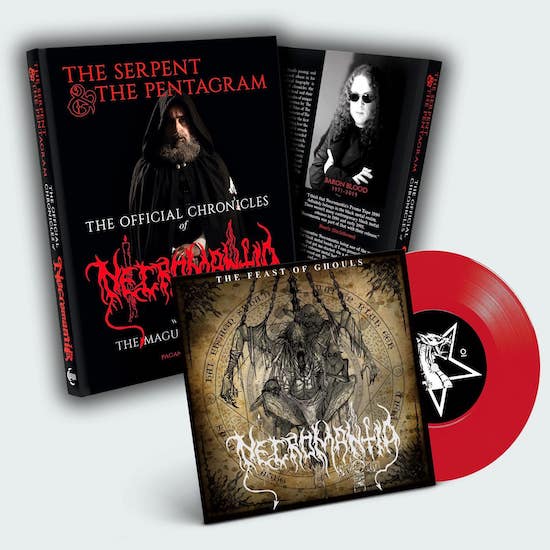
Your second book is a biography of Necromantia, The Serpent & The Pentagram. Did you plan to write it already during the work on Rites of The Abyss? What was your initial plan?
You guessed right. The idea for The Serpent & The Pentagram occurred while finalizing the material for Rites Of The Abyss. The same happened with the third book, which is in the works.
You mentioned this kind of egregore in your previous question. Well, in those two instances I felt that something like that led to the next two books being materialized; and that I was chosen as the messenger. I didn’t plan that, to be honest. My idea was one book only and then stop, because it was excruciating work. But especially with the Necromantia book, in which The Magus was fully involved, some supernatural intervention shouldn’t come as a surprise. As a trivia fact, back in the early ’90s he was considered the absolute authority in the Greek scene, regarding the occult.
Is it too early to ask details about the third book? Will it be a biography of some band or something else?
Yes, it will be a biography. The band has already given some hints in recent interviews, one of which was for No Clean Singing. Αnd if you go to my answer of your first question in this interview, my own hint is there. It’s been in process for three years and I am the co-author, just as I did with the Necromantia biography. It’s quite extensive and rich in content, so that held us back a little. We are at the stage of refining the material and it will be out, hopefully in 2024. There are some damn interesting stories in there and the layout and presentation will be top-notch again.
Non Serviam, the biography of Rotting Christ, had already been published by then. Did it spur you somehow?
I’ve read the biography of Rotting Christ and other works by Patterson. I appreciate his books and they are testaments in the scene. However, I wanted the Necromantia biography to read as a more personal book and less journalistic. With some of the introspection found in the biographies of Ozzy, Iommi or Lemmy, which are amazing reads, by the way. Also, to cover a wider spectrum of topics and paint a more vivid picture of the Greek black metal scene in its beginning.
I am Greek and middle-aged already, so I lived the whole thing here first-hand back then. In addition, Necromantia never performed live, so we didn’t have tours or live tales to include; with a few exceptions, when The Magus played three shows with Rotting Christ. Therefore, we decided to include all relevant endeavors he was involved with: the other musical projects or bands he participated in, his fanzines and record labels, and his occult research. The same happened with the details he – and other peers – could remember about the late Baron Blood.
Finally, both The Magus and I wanted a truly striking visual result for the book and a luxurious edition. There are touches of Fisher’s & Ain’s Only Death Is Real in the final result, for those with a sharp eye to detail. And a pinch of horror zine ideas in there as well.
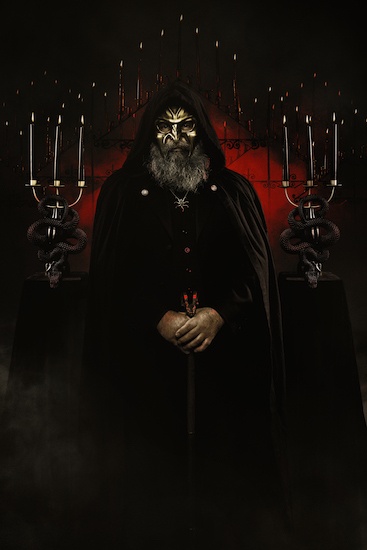
What new things did you learn about Necromantia during your interviews with its members and their companions?
So many things that I can’t even start mentioning them here. And especially all those details regarding the life and relationship of The Magus and Baron Blood and how they were reflected on Necromantia. In fact, it was pure joy for me to work on this book and discover where all their ideas and influences came from. And that worked in favor of the book, because afterwards several people admitted that they listened to all the band’s releases from the beginning while reading the book. That way they could decrypt and appreciate them in a new perspective.
Were you able to reach all the persons you liked to be involved in the project? Which contact was the most difficult to reach?
Once more, I must stress that The Magus made a big difference with this book, because he managed to secure almost all the people we wanted to participate with their memories and comments. He also put superb effort for the photo material, which was very rare in the case of Necromantia’s low profile. Keep in mind, Baron Blood was not fond of photos.
We were both surprised the most by Dani from Cradle of Filth, who even cited Necromantia as an early influence for his own band. And everyone else was really supportive; respected veterans as well as acclaimed new blood from the Greek scene and abroad. And the helpful fans of the Necromantia legions, of course. My gratitude to all of them.
What’s with the books’ distribution? And do you already have offers to see your books translated into other languages? Did you ever think of releasing it in Greek?
The distribution of the first book faced some difficulties because it was from a UK publisher and we got caught right in the time of Brexit. We found a way around that problem to a certain extent. The second book was published in the EU, so things were easier. And of course the cult name of Necromantia and the 7’’ EP accompanying the limited edition gave it a big push. It also got published in Polish, which felt awesome. There might be ideas to publish the books in other languages, but surprisingly not in Greek yet. I think the ‘‘niche’’ topic of Greek black metal and the elaborate/costly editions the books require discourage Greek publishers.
I am lucky the publishers for both books agreed with a top-notch layout, design and printing quality. Heavy Music Artwork did a great job with Rites of the Abyss and set very high standards. Pagan Records took it to another level with the Necromantia biography. I feel the Latin American region would be promising, because of their strong affection for the Greek scene. And also the Russian one, so if you or anyone has any ideas, bring them on!
Thank you for the interview, Aris! I wish you good luck with the third book, and let’s hope that both Rites of the Abyss and The Serpent & The Pentagram will find their readers. Did we skip something important?
I must thank you for this in-depth interview. I feel we covered everything and I appreciate your interest in our scene, above all. And my wish is for the books to find their readers and let them get a deeper look at the whole phenomenon of Hellenic black metal. That is my greatest reward, along with the pleasure of working with the bands on those books.
https://store.heavymusicartwork.com/products/rites-of-the-abyss
https://necromantiaofficial.bandcamp.com/merch/rites-of-the-abyss-by-aris-shock-hma-publishing
https://www.pagan-records.com/en_GB/p/NECROMANTIA-The-Serpent-The-Pentagram-BOOK-7-VINYL/12855
https://www.pagan-records.com/en_GB/p/NECROMANTIA-The-Serpent-The-Pentagram-BOOK-/12854
